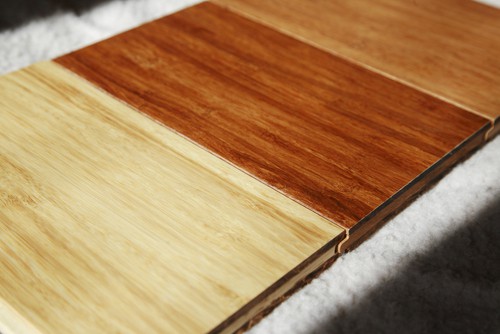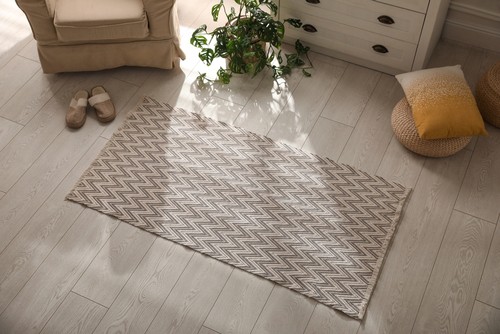
Protecting Laminate Floors During a Move
November 1, 2023
Laminate Flooring and Allergies: A Healthy Home Solution
December 26, 2023The Health Benefits of Bamboo Flooring

The Health Benefits of Bamboo Flooring
The Health Benefits of Bamboo Flooring. In recent years, bamboo flooring has grown in popularity as homeowners and environmental enthusiasts seek sustainable and health-conscious alternatives to conventional flooring materials.
This article explores the numerous health benefits associated with bamboo flooring, making it an ideal choice for those concerned about indoor air quality, allergies, chemical sensitivities, and overall well-being.
Table of Contents
Allergen-Free Flooring
Indoor air quality can significantly impact our health. Allergens, such as dust mites and pollen, are common culprits behind allergies and respiratory issues, making allergen-free flooring a priority.
Bamboo possesses natural properties that make it inhospitable to allergens, creating a healthier indoor environment for allergy and asthma sufferers.
Bamboo flooring can relieve individuals with allergies and asthma by reducing allergen buildup, resulting in improved respiratory health and overall well-being.
Low VOC Emissions
Understanding VOCs (Volatile Organic Compounds)
Volatile Organic Compounds (VOCs) are chemicals commonly found in indoor environments, emitted from various sources, including flooring materials. High VOC levels can contribute to health issues.
Bamboo Flooring’s Low VOC Properties
Bamboo flooring is known for its low VOC emissions, promoting better indoor air quality and reducing the risk of respiratory problems associated with high VOC exposure.
Promoting Better Indoor Air Quality
Bamboo flooring contributes to a healthier indoor environment by minimizing VOC exposure, a critical consideration for families, especially those with young children or sensitive individuals.
Hypoallergenic and Non-Toxic

Bamboo is a hypoallergenic and non-toxic flooring option, making it suitable for families with children and pets. Its chemical-free nature reduces the risk of exposure to harmful substances.
The safety of bamboo flooring makes it an excellent choice for households with little ones and pets who spend significant time on the floor, promoting a healthier living environment.
Choosing non-toxic bamboo flooring helps minimize chemical exposure, creating a safer and healthier space for everyone in the household.
Resistance to Mold and Mildew
Bamboo boasts natural resistance to moisture, reducing the likelihood of mold and mildew growth. This inherent quality contributes to a healthier living environment by preventing the development of harmful microorganisms.
Bamboo flooring’s ability to deter mold and mildew is particularly advantageous in high-humidity environments where these fungi can thrive.
By choosing bamboo flooring, homeowners can reduce the risk of respiratory issues associated with mold exposure.
In regions with humid climates or areas prone to moisture, such as bathrooms and kitchens, bamboo flooring’s resistance to mold and mildew is a valuable health benefit that promotes clean and breathable air.
Eco-Friendly and Sustainable
Sustainable Bamboo Farming Practices
Bamboo is renowned for its sustainability, thanks to its rapid growth and minimal resource requirements. Bamboo forests are efficiently managed, reducing the ecological impact compared to traditional hardwood harvesting.
Low Environmental Impact
By opting for bamboo flooring, consumers contribute to a reduced environmental footprint. Bamboo’s ability to regenerate quickly and its minimal need for pesticides and fertilizers align with eco-conscious living.
Supporting Sustainable Living
Choosing bamboo flooring extends beyond the immediate health benefits. It reflects a commitment to sustainable living and environmental responsibility, promoting a healthier planet for future generations.
Durability and Longevity

Bamboo flooring is celebrated for its durability and longevity. Its robustness minimizes the need for frequent replacements, reducing waste and associated environmental impact.
The extended lifespan of bamboo flooring means fewer resources are consumed in producing and installing new flooring, aligning with sustainable and health-conscious living.
The longevity of bamboo flooring benefits the environment and the homeowner’s wallet. Less frequent replacement translates to long-term cost savings and reduced material consumption.
Easy Maintenance and Cleaning
Bamboo flooring’s ease of maintenance simplifies the cleaning process, reducing the need for harsh chemical cleaners that can negatively impact indoor air quality.
The ability to clean bamboo flooring with minimal chemicals promotes a healthier living environment by minimizing exposure to potentially harmful cleaning agents.
By choosing bamboo flooring, homeowners can maintain a cleaner and healthier living space, as the flooring’s low maintenance requirements contribute to a reduced chemical burden indoors.
Comfort and Insulation
Bamboo’s Natural Warmth and Comfort
Bamboo flooring offers a natural warmth and comfort underfoot, enhancing the overall livability of a space. This feature is particularly appreciated during the colder months, as it minimizes the need for additional heating.
Enhanced Thermal Insulation
Bamboo flooring possesses natural thermal insulation properties. It helps maintain a comfortable indoor temperature, reducing the reliance on heating and cooling systems. This, in turn, contributes to energy efficiency and cost savings.
Energy Efficiency and Comfort
The combination of bamboo’s thermal insulation and comfort factors promotes energy-efficient living. It fosters a cozy atmosphere and reduces energy consumption, benefiting both the environment and the occupants’ well-being.
Aesthetic and Design Flexibility

Bamboo flooring is available in a diverse range of styles, colors, and finishes, allowing homeowners to tailor their flooring to match their interior design preferences. This flexibility promotes a harmonious and visually appealing living environment.
Bamboo flooring can seamlessly integrate into various interior design styles, from minimalist and modern to classic and rustic. Its adaptability ensures that it enhances the aesthetics of any space it graces.
Customizing bamboo flooring to suit individual tastes promotes well-being and satisfaction in one’s living space, contributing to overall mental and emotional health.
Promoting a Healthy Lifestyle
Research has shown a strong link between the environment in which we live and our health. Bamboo flooring’s numerous health-related advantages create a conducive and nurturing living environment.
Choosing bamboo flooring extends beyond practicality; it reflects a conscious decision to prioritize well-being for oneself and the planet. The health benefits of bamboo flooring align with a holistic approach to a healthier lifestyle.
Individuals actively participate in sustainable and healthy living by opting for bamboo flooring. They create spaces fostering physical, mental, and environmental wellness.
Frequently Asked Questions
Can bamboo flooring help with indoor air quality?
Bamboo flooring can improve indoor air quality by emitting fewer volatile organic compounds (VOCs) and resisting allergen buildup.
Is bamboo flooring suitable for those with chemical sensitivities?
Bamboo flooring is an excellent choice for individuals with chemical sensitivities due to its low VOC emissions and non-toxic nature.
What are the maintenance requirements for bamboo flooring?
Bamboo flooring is easy to maintain, requiring routine cleaning with minimal chemical use, contributing to a healthier living environment.
How does bamboo compare to other flooring materials in terms of health benefits?
Bamboo flooring offers unique health benefits, including allergen resistance, low VOC emissions, sustainability, and ease of maintenance, making it a compelling choice for health-conscious individuals.
Can bamboo flooring contribute to a more sustainable lifestyle?
Yes, bamboo flooring aligns with a sustainable lifestyle by promoting eco-friendly practices, reducing waste through its durability, and supporting responsible forest management.
The Health Benefits of Bamboo Flooring – Conclusion

In conclusion, bamboo flooring is a testament to the intersection of sustainability, health, and design.
Its multifaceted health benefits, ranging from allergen resistance to low VOC emissions and thermal insulation, create a living environment that nurtures physical, mental, and environmental well-being.
By choosing bamboo flooring, individuals invest in a healthier lifestyle and support a more sustainable and harmonious world.
Are you seeking a professional and reliable bamboo flooring supplier in Singapore? Contact us today!



